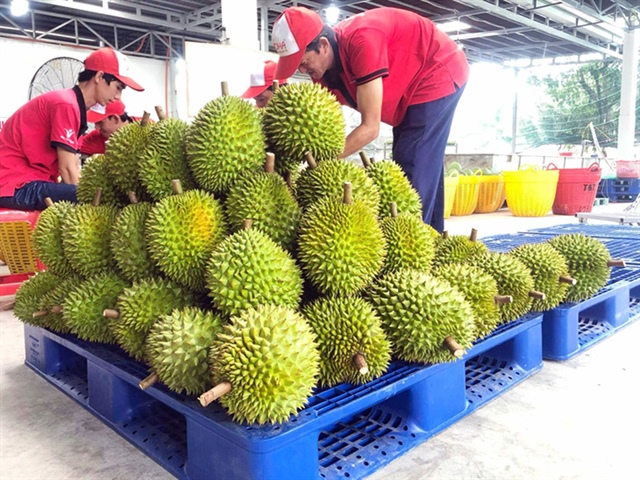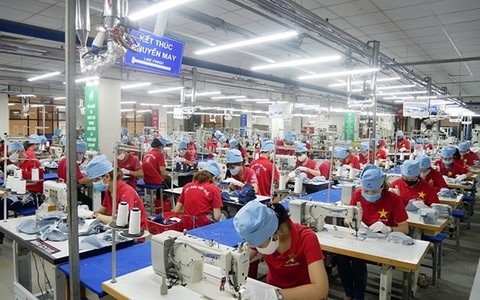Improving productivity in the context of industrialisation
Improving productivity in the context of industrialisation
As Industry 4.0 exerts a sharp effect on the economic structure, development, growth rate, and the models of business and labour usage, Vietnam Economic Forum was organised today to provide specific solutions for Vietnam to seize advantages in production and improve productivity, contributing to the improvement of growth quality and economic competitiveness.
Vietnam’s economic growth has been on the fall. During 2001-2005, the average economic growth was 7.51 per cent per annum, while in the 2006-2010 period it was 7.02 per cent and 5.67 per cent during 2011-2015.
Statistics show that Vietnam’s productivity is equivalent to only 7 per cent of Singapore’s, 17.6 per cent of Malaysia, 36.5 per cent of Thailand, 42.3 per cent of Myanmar, 56.7 per cent of the Philippines, and 87.4 per cent of Laos.
Ngo Van Tuan, deputy chairman of the Central Party Committee’s Economic Commission, emphasised: “The most important thing is to strengthen total-factor productivity (TFP), science-technology applications, and innovation. These are the foundations to improve the competitiveness of every country and achieve sustainable economic development.”
Japanese Ambassador Umeda Kunio assessed that with the doi moi policy, Vietnam has achieved steady economic growth utilising foreign capital and low-cost labour as its main engines for economic development. However, in order to avoid the middle-income trap and maintain further sustainable development, the country needs to establish a new growth model. It is urgent for Vietnam to promote its industries and strengthen its competitiveness.
In order to strengthen competitiveness, Kunio recommended a three-pronged approach. “First, I would like to suggest that the Communist Party of Vietnam and its government initiate a nation-wide campaign to make more people realise that productivity improvement is key to strengthening the competitiveness of Vietnamese industries and to outline concrete actions. Japan has played a key role in the initial steps.”
He said that some Vietnamese firms, such as THACO and Haiphong JSC, have shown success in improving their productivity after carrying out his proposals. Vietnam Posts and Telecommunications Group has greatly improved the reliability and speed of its services in Hanoi and Ho Chi Minh City since 2015, after entering a co-operation with Japan Post Group.
In addition, the Japan International Co-operation Agency (JICA) has offered lectures on improving factories' productivity in Hanoi, Ho Chi Minh City, and Haiphong since 2009. So far, 413 Vietnamese managers of various manufacturing companies have participated in these lectures. Even after the lectures, they continued to share their experiences with each other.
“It is essential for Vietnam to improve not only the productivity of private companies but also that of its government, which supports the private sector. Thus, the Vietnamese government and the Communist Party’s current initiatives of streamlining the administrative procedures and reforming state-owned enterprises are important for the future of the country,” emphasised the ambassador.
Kenichi Ohno from the National Graduate Institute of Economic Management said: "Vietnamese labour productivity is very low compared with other countries in Asia, even lower than Laos. With the existing weaknesses in policies and labour productivity, Vietnam will face difficulties in exiting the middle-income trap as well as reaching its economic growth targets.”
Thus, the Vietnamese government should consider the following solutions to improve the productivity of the overall economy in general and labour productivity in particular. Notably, Vietnam needs to build specific productivity reports as well as implement a mindset campaign via various media channels. The awareness campaign must be continued for several years until productivity becomes a part of national philosophy.
Besides, the government needs to set detailed productivity targets, addressing a gaping hole in its global integration efforts.
Furthermore, the Vietnamese government needs to revamp concrete productivity tools, while at the same time mobilise Vietnamese workers to learn manufacturing skills to serve for Vietnam’s industrialisation target.
James Mullen, vice president of ABB Ltd., noted: "Talking from my company’s experience, we need to change the attitude and working style of workers towards increased professionalism and discipline.
Domestic firms need to invest more into human resources management software.
"We co-operated with numerous Vietnamese suppliers. Previously, they often delivered low-quality or the wrong products, which ABB refused to take over, dictating strict quality requirements. After a while, we are proud of seeing how these firms made excellent advancement in the area," Mullen said.
Tran Van Tho, a professor of economics at the faculty of Social Sciences of Waseda University in Japan, outlined: "Vietnam has sprung the middle income trap. To exit from this trap, Vietnam needs to build strategies and policies for improving productivity. Notably, Vietnam must broaden and deepen industrialisation in order to avoid premature deindustrialisation as well as create high productivity employment for labour shifting from agriculture and household businesses. Additionally, Vietnam needs to change its foreign direct investment (FDI) attractions strategy, promote domestic companies’ participation in the global supply chain, and increase productivity via technology transfer."











